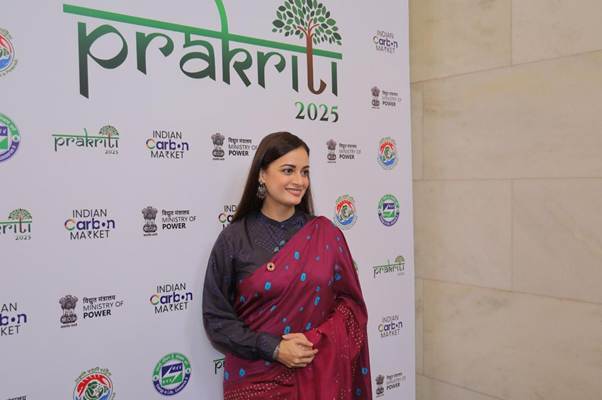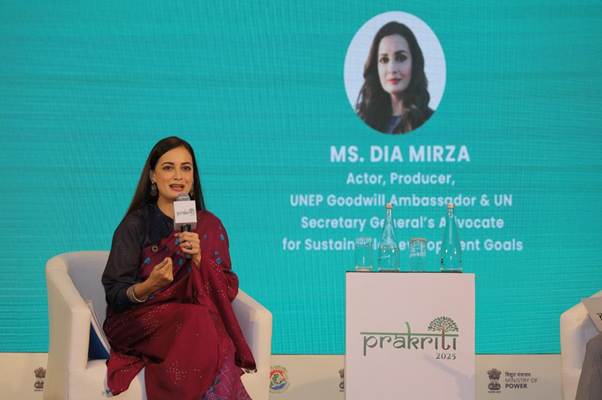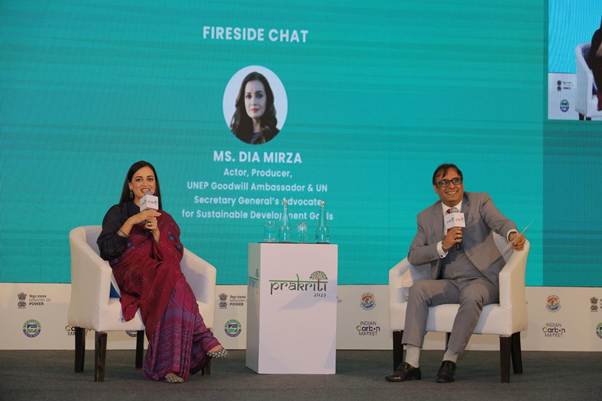New Delhi:(PIB) PRAKRITI 2025 (Promoting Resilience, Awareness, Knowledge, and Resources for Integrating Transformational Initiatives), the International Conference on Carbon Markets, successfully concluded on its second day, bringing together national and international experts, policymakers, industry leaders, researchers, and practitioners. The conference was inaugurated on February 24, 2025, by Shri Manohar Lal, Hon’ble Minister of Power and Housing & Urban Affairs. As a flagship initiative of the Government of India, organized by the Bureau of Energy Efficiency under the patronage of the Ministry of Power and the Ministry of Environment, Forest and Climate Change, PRAKRITI 2025 served as a premier platform for in-depth discussions on global carbon market trends, challenges, and future pathways.
Ms. Dia Mirza, Actor, Producer, National Goodwill Ambassador for United Nations graced the event with her presence. She participated in an impactful fireside chat moderated by Mr. Saurabh Diddi, Director, Bureau of Energy Efficiency. Speaking of her role in making a change in the climate change scenario, she said that, “As an individual, I have the capacity to change the way I live and hopefully thereby bring some change in the world. Big change will only occur when it starts from the top down because behaviours sometimes take hundreds of years to change.” She commended the Government of India for its initiatives under LiFE (Lifestyle for Environment), highlighting its role in promoting mindful consumption and leading a global movement. Additionally, she emphasized the importance of engaging children and youth to drive meaningful change in climate conversations. Concluding the interview, she shared her vision for sustainability, stating, “My dream sustainability project, if finances didn’t have any upper limit, would be one, to eradicate each and every unit of single use plastics, and two, a scenario where every resource comes in the circular economy.”



Mr. Thomas Kerr, Lead Climate Change Specialist, World Bank chaired and moderated the opening plenary session on Private Sector Perspectives on Indian Carbon Market (ICM). He emphasized that the Indian Carbon Market does not operate in isolation, as global carbon pricing policies will influence India’s industries. Businesses must prepare for these shifts. He highlighted the impact of the European Union’s Carbon Border Adjustment Mechanism (CBAM) on Indian exports, particularly in steel, aluminium, and other high-emission industries, stating, “The European Union’s Carbon Border Adjustment Mechanism (CBAM) will impact Indian exports, particularly in steel, aluminium, and other high-emission industries. This calls for urgent action in domestic carbon markets.” Encouraging India’s active participation, he added, “If you build it, they will come.”
Mr. Ashok Lavasa, Former Finance Secretary and Government Official, delivered a thematic address on Governance, Transparency, and Accountability in Climate Finance and Carbon Markets. His speech highlighted the complexities of global carbon markets and the challenges India faces in developing a robust system. Emphasizing key factors for success, he stated, “Strong MRV frameworks, fair benefit distribution, and strategic market alignment are crucial to India’s success in the carbon economy. International collaboration is necessary, but India must develop policies tailored to its own needs and challenges.”
The second day of the conference featured thematic addresses and a series of plenary sessions led by senior government officials and industry experts. Key discussions focused on: Incentivizing Renewable Energy developers through Carbon Markets, Development in Article 6 and Opportunities for India, Bringing Price Transparency in Global Carbon Marketplace, Role of Ecosystem-Based Interventions in Achieving Net-Zero Goals, Climate Tech Startups for Sustainable Development, and Leveraging finance for the deployment of clean technologies.
The two-day event witnessed robust participation from key Indian ministries, including the Ministry of Power, Ministry of Environment, Forest and Climate Change, and the Ministry of Agriculture, Financial Institutions, Corporates, International NGOs, PSUs, etc. Approximately 80+ experts and 600+ delegates engaged in the conference’s discussion in the last two days, focusing on carbon market mechanisms, policy framework, climate finance and technologies. This demonstrates a coordinated, intergovernmental strategy, fostering synergistic collaboration and broad stakeholder participation, affirming India’s dedication to meet climate goals.
More than just a conference, Prakriti 2025 has distinguished itself as one of the most comprehensive and significant carbon market events for learning, sharing knowledge, and exploring opportunities for collaboration in the global effort to combat climate change. Prakriti 2025 will build on this momentum, marking a significant milestone in both India’s national climate agenda and the broader international climate discourse.
About BEE
The Government of India set up the Bureau of Energy Efficiency (BEE) on March 1, 2002 under the provisions of the Energy Conservation Act, 2001. The mission of the Bureau of Energy Efficiency is to assist in developing policies and strategies with a thrust on self-regulation and market principles, within the overall framework of the Energy Conservation Act, 2001 with the primary objective of reducing the energy intensity of the Indian economy. BEE coordinates with designated consumers, designated agencies and other organizations and recognises, identifies and utilises the existing resources and infrastructure, in performing the functions assigned to it under the Energy Conservation Act. The Energy Conservation Act provides for regulatory and promotional functions.





